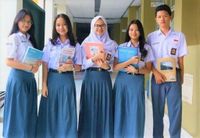The Indonesian government is set to reinstate the specialization system of Science (IPA), Social Sciences (IPS), and Language at the Senior High School (SMA) level for the academic year 2025/2026. This announcement was made by the Minister of Basic and Secondary Education, Abdul Mu'ti, during a Halalbihalal event with the Education Journalist Forum in Jakarta on April 11, 2025.
Mu'ti stated that the exact date for the implementation of the majors has not yet been disclosed. However, he emphasized the necessity of this change to support the Academic Ability Test (TKA), which is being introduced as a replacement for the National Examination (UN). The TKA is set to be piloted for 12th-grade students in November 2025.
According to Mu'ti, the TKA will assess subjects that students typically study, making it essential to reintroduce the majors. "The majors will be revived. So later there will be majors again: Science, Social Sciences, and Language," he explained. He elaborated that the TKA will include mandatory subjects such as Indonesian Language and Mathematics, along with specialized subjects for each major. For instance, students in the Science major can select additional subjects like Biology, Physics, and Chemistry, while those in Social Sciences can choose from Economics, Geography, History, and other related fields.
Mu'ti expressed hope that the TKA, together with the reinstatement of majors, will provide a clearer picture of students' abilities and their suitability for chosen study programs at the tertiary level. He envisions the TKA as a valid and standardized assessment tool for universities when considering new student admissions.
The plan to reinstate these majors has garnered mixed reactions from education practitioners. Unifah Rosyidi, the Chairperson of the Indonesian Teachers Association (PGRI), supports this move, stating that it is crucial for students to have a solid knowledge base before diving into specific fields. "With the return of the majors, students will have knowledge aligned with their interests, which will support them in mastering the subjects they wish to pursue professionally," she noted.
Another education expert, Heriyanto, pointed out that the current elimination of majors has not been effectively implemented in practice. He argued that it is premature for students in the 11th grade to determine their future career paths, leading to confusion over subject selection. He highlighted instances where students interested in medicine might drop Physics, only to later shift their focus to engineering, leaving them unprepared.
Ignasius Sudaryanto, a Geography teacher at SMA Pangudi Luhur II Servasius Bekasi, echoed this sentiment, advocating for the return of the majors to foster focused learning and ease resource management within schools. He noted that the previous system allowed students to specialize, which can lead to better educational outcomes.
The reinstatement of majors comes less than a year after their elimination, which was part of the Independent Curriculum introduced in the 2024/2025 academic year. This curriculum aimed to offer students greater freedom in selecting subjects based on their interests, talents, and career aspirations.
However, the swift policy changes have raised concerns among education observers about the lack of a coherent educational roadmap in Indonesia. Ubaid Matraji, the National Coordinator of the Indonesian Education Monitoring Network, criticized the rapid shifts in policy without thorough research, suggesting that it indicates a lack of long-term planning.
Matraji pointed out that the National Development Planning Agency (Bappenas) launched the Indonesian Education Roadmap 2025-2045, which emphasizes the need for quality education. This roadmap highlights Indonesia's position as low-performing in international assessments, particularly in reading, mathematics, and science, compared to countries like Singapore and Vietnam.
Moreover, Totok Amin Soefijanto, an education observer from Paramadina University, criticized the frequent changes in educational policy, suggesting that they reflect a lack of direction. He argued that the previous major system was designed to optimize students' talents and interests as they transitioned to higher education.
Abdul Mu'ti defended the decision to reinstate the majors, stating that it was not based on personal issues with former Minister Nadiem Makarim, who abolished the system. He emphasized that this change is necessary for ensuring sustainability across all educational levels.
Students have also voiced their opinions on the proposed changes. Ryu, a 10th-grade student from Jakarta, expressed hope that the reinstatement of majors would come with equal learning facilities for all disciplines. He believes that the current Independent Curriculum has made learning feel less rigorous and hopes that a return to a more structured system would help him focus on subjects he is passionate about.
As the Indonesian education system prepares for this significant shift, it remains to be seen how the reinstatement of majors will impact students' academic journeys and the overall quality of education in the country. The government’s commitment to improving educational outcomes will require not just policy changes but also substantial investments in teacher training and educational resources.
With the TKA set to begin in November 2025, the stakes are high for students, educators, and policymakers alike as they navigate this new chapter in Indonesia's educational landscape.





